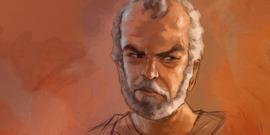Korah’s Rebellion
16: 1-50
The rebellions continue to spread: from Levites to lay leaders to all the people.
Earlier there had been a rebellion against the leadership of Moses by Miryam and Aaron (to see link click Bu – The Rebellion of Miryam and Aaron). Chapter 16 presents three rebellions against the leadership of Moses and Aaron: first, by Korah (see Co – The Rebellion of Korah); second, by Dathan and Abiram (see Cq – The Rebellion of Dathan and Abiram); and third, by all the people (see Cs – The Rebellion of All the People).

Korah was a descendant of Levi through the esteemed Kohath clan. The Kohathites were responsible for transporting the most holy things in the Tabernacle, which included the ark of the covenant, when the nation of Isra’el was moving from one location to another (see At – The Clan of Kohath). Other than that, as a Levite, he was to assist the priesthood with their daily tasks in the Tabernacle courtyard. This was a great honor, but evidently that wasn’t enough for Korah. He desired something better . . . he wanted to be a priest. So, he led a rebellion (see the commentary on Jude Aq – They Have Taken the Way of Cain, Rushed into Balaam’s Error), and used the holiness of the whole community (15:40) as the basis for arguing that anyone, layman or Levite, could offer sacrifices on the bronze altar; that it was not an exclusive right of Aaron and his sons. Isra’el’s fortunes had reached a low ebb. Demoralized by the majority report of the spies and condemned by their God to die in the wilderness, the people were psychologically receptive to rebellious appeals to overthrow their leadership and return to Egypt. Thus, Chapter 16 simply confirms and extends the rebellious character of the Exodus generation that was already evident in the earlier stories of rebellion.300



Leave A Comment